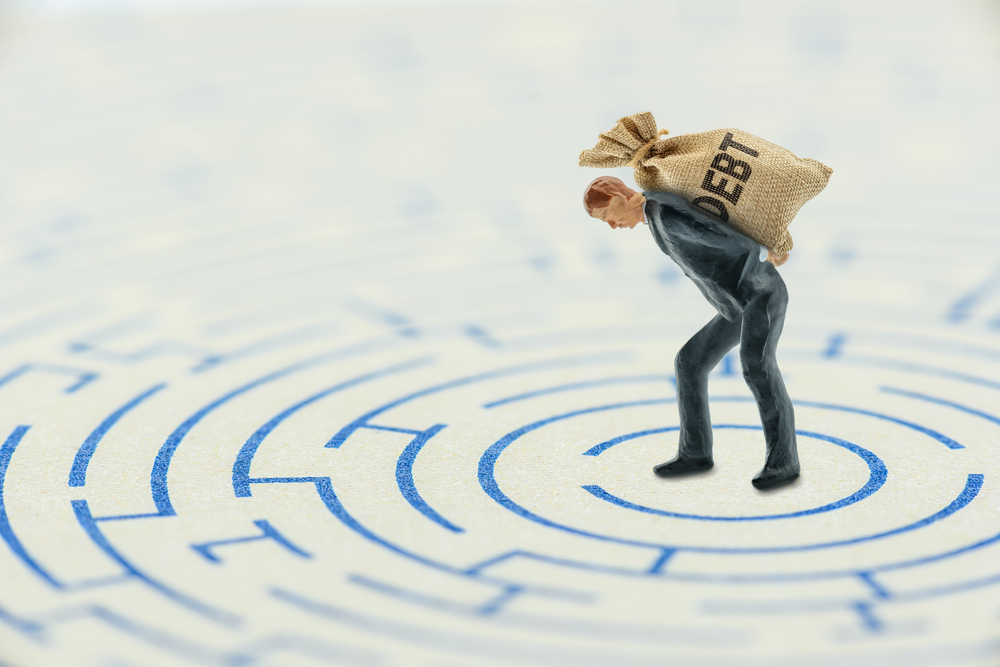
Debt forgiveness. It’s a term that might seem shrouded in complexity, but in reality, it can be a glimmer of hope for people navigating choppy financial waters.
Sometimes life can throw you a curveball. Whether that comes in the form of a sudden job loss, medical emergency or global pandemic, the weight of growing debts can feel overwhelming. But what if there was a way out, a second chance?
At Harris & Partners, we have been helping Canadians solve their financial troubles with integrity for more than 50 years. We believe that everyone deserves a path to financial stability and recovery. So, if you’re looking into debt forgiveness as an option for managing your debt, read on to learn everything you need to know before you make a decision.
- Debt forgiveness explained
- Consumer Proposals
- Bankruptcy
- Debt management alternatives
Debt forgiveness explained
At its core, debt forgiveness offers the possibility for a person or organisation’s debt to be partially or completely wiped clean.
It starts with an evaluation, where lenders determine the borrower’s ability (or inability) to repay their debt. Usually, this will involve looking into a person’s financial situation, their income, and the reasons for their hardship.
While debt forgiveness can give you some immediate financial relief, it can also come with negative consequences for your credit score, affecting your ability to borrow funds in the future.
Consumer Proposals
A consumer proposal is a legally binding process, coordinated by a Licensed Insolvency Trustee. It lets you settle your debt with creditors by paying back only a portion of what is owed and forgiving the remaining debt, making it more manageable to pay off.
Pros of Consumer Proposals
- Debt forgiveness: The most obvious benefit is that you repay just a fraction of what you owe.
- No interest: Interest on your debt stops accruing.
- Legal protection: Upon filing a consumer proposal, you are protected from debt collectors, so you can say goodbye to those stressful and sometimes relentless phone calls.
- Maintain assets: Unlike bankruptcy, with a consumer proposal, you get to keep your assets, such as your home or your car, RESP, or RRSP. This means you don’t have to make major adjustments to your lifestyle to pay off your debts.
- Structured payments: The payment plan is structured based on what you can afford, not what creditors demand.
- Mandatory financial counselling: You will need to attend financial counselling sessions to help you understand and manage your finances better.
Cons of Consumer Proposals
- Credit rating impact: Consumer proposals will likely have a negative impact on your credit score, remaining on your record for three years after the proposal is complete or six years from the date of filing – whichever happens first.
- Not all debts are covered: Some debts, like secured debts, student loans that are less than 7 years old, and child or spousal support are not included. Not sure if you’re eligible? Get in touch with our professionals and we can talk you through your options.
- Longer than bankruptcy: Depending on the situation, the repayment term can sometimes be longer than bankruptcy, though the effects aren’t as long.
- Public record: Consumer proposals will become public record, so may be accessed and potentially viewed by others. There is, however, an access fee and the search has to be very specific.
Bankruptcy
Declaring bankruptcy is a debt relief solution that involves clearing all debt so people can start fresh. This usually involves signing over your property or other assets, and so, while it shouldn’t be your first resort, it is a viable way to receive debt forgiveness.
Pros of bankruptcy
- Fresh start: As most of your debts will be erased by a successful bankruptcy, it gives individuals a chance to start fresh without the weight of debt hanging over them.
- Immediate protection: As soon as you file for bankruptcy, you receive legal protection from your creditors. This means you won’t have to deal with harassing and stressful phone calls.
- Quick resolution: Compared to other debt solutions, bankruptcy can often be a faster way to resolve debt.
- Mandatory financial counselling: Like with consumer proposals, bankruptcy includes financial counselling sessions to help you understand and manage your finances better.
Cons of bankruptcy
- Asset loss: While there can be exemptions, you may lose some of your assets in bankruptcy, such as your home, car or other valuables.
- Credit impact: Bankruptcy has a severe impact on your credit score. For a first-time bankruptcy, this mark stays on your credit report for six years after your discharge. For a second bankruptcy, it is 14 years. As a result, this may make it more difficult for you to borrow money in the future.
- Public record: Your bankruptcy is a matter of public record. This means it can be accessed and potentially viewed by others. That being said, there is an access fee and the search has to be very specific.
- Not all debts are discharged: Some debts cannot be erased by bankruptcy, including spouse or child support, student loans less than seven years old.
- Costs: While declaring bankruptcy can alleviate debt, it’s not free. There are fees involved, including those for the Licensed Insolvency Trustee and administrative costs.
- Lose your tax refund: In the year of filing, you will not be entitled to a tax refund.
Read our guide – What happens to debt when someone dies in Canada?
Debt management alternatives
Navigating the complexities of debt can sometimes feel overwhelming. But remember, every financial challenge has a potential solution, and sometimes, it’s all about finding the right fit for your circumstances. If you’re not sure that debt forgiveness is the right path for you, there are alternative options.
Debt consolidation
Debt consolidation involves taking multiple debts and combining them into a single, larger debt, usually with a more favourable interest rate or payment terms. This is typically achieved through a debt consolidation loan.
Debt consolidation can simplify repayments whilst also potentially lowering interest rates. However, consolidation loans tend to require collateral to protect the lender from potentially missed repayments, and this can include important assets like your home. They are also extremely difficult to qualify for and, ultimately, don’t reduce your debt, just your repayment.
Debt settlement
Debt settlement involves negotiating with your creditors to allow you to pay a lump sum, typically less than what you owe, to settle your debt. If it’s successful, you’ll repay less than the original debt amount, and you won’t have to file for bankruptcy.
Creditors aren’t obligated to accept settlement offers, however, so success is not guaranteed. Similarly, settlements can negatively affect your credit score, making it difficult to borrow money in the future. They also don’t bind all creditors to the same plan, and they can change their minds at any time. Since this is also not a formal process, no one is legally bound like they are in a consumer proposal.
Take back financial control with Harris & Partners
Navigating the maze of financial decisions and debt solutions is no easy task, but you don’t have to do it alone. With over 50 years of experience with debt forgiveness, Harris & Partners are on hand to help.
Every financial situation is as unique as the person behind it, and one-size-fits-all solutions rarely work. That’s why we are dedicated to understanding your personal financial troubles and goals. With this, we can help you find the best possible solution.
Ready to start your journey to financial independence? Get in touch with our bankruptcy trustee professionals today.










